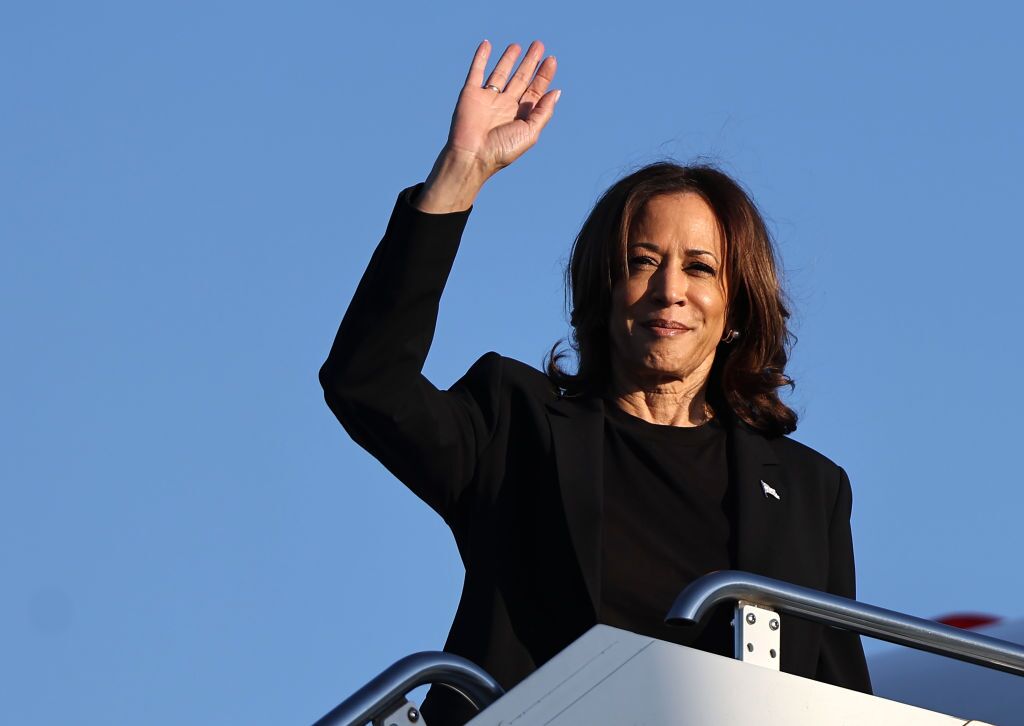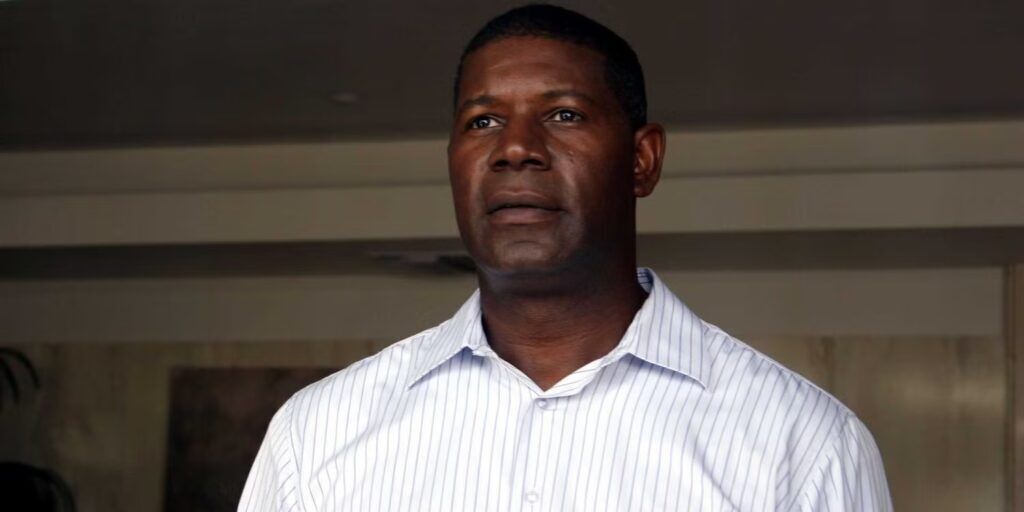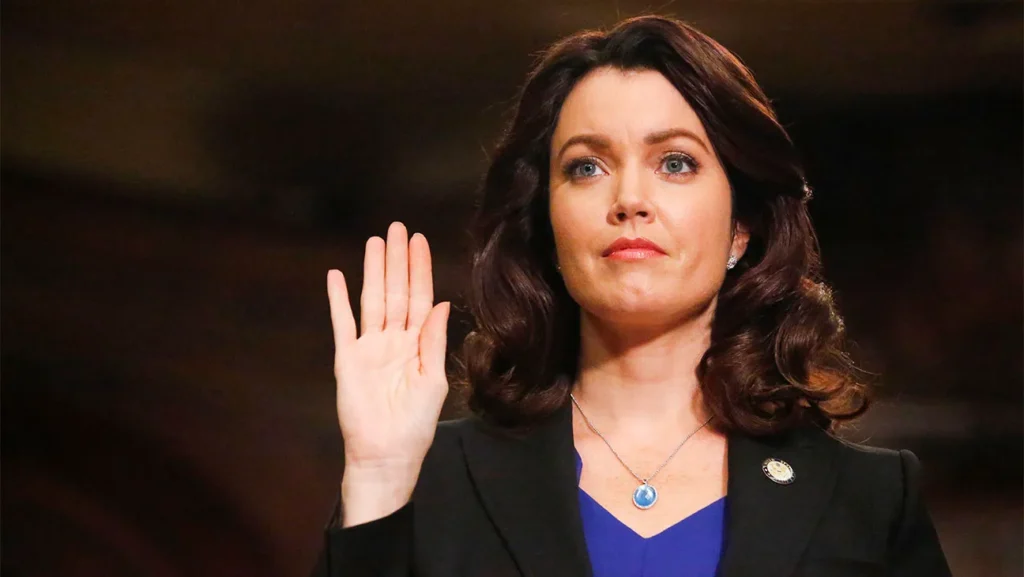Angela Bassett’s turn in Mission: Impossible blurs the line between the impossible fictions and possible realities of women’s power in American politics.
This is Part 1 of a two-part series on women leaders and feminist leadership. Part 2—out Monday, June 2—continues with a public syllabus.
Spoiler alert: This piece contains plot details from Mission: Impossible–The Final Reckoning.
The Final Reckoning—the eighth and final installment of Mission: Impossible—went toe-to-toe with Disney’s live-action remake of Lilo & Stitch in a global mega blockbuster blowout for the Memorial Day holiday weekend. As a movie franchise, it did not disappoint, as audiences feasted their eyes on a series of magically impossible feats that only a Tom Cruise-led Hollywood vehicle could deliver.
This action behemoth featured Cruise’s action hero Ethan Hunt deep-sea diving through a submarine buried 500 feet deep into the abyss. He also withstood sub-zero temperatures as he swam near naked just below the Bering Strait (even though he had to be resuscitated back to life). And of course, how could we not have another sky-diving action sequence as he engaged in a plane duel with his nemesis thousands of feet up in the air? This intense action—plus the usual bomb explosions, country-hopping across the globe, and a fearsome AI threatening world domination through nuclear-powered annihilation—made for a captivating cinematic thrill ride that can only come to life on the big screen.

And yet, of all these death-defying spectacles offered in a packed action flick, perhaps the most implausible fiction was…
A Black woman president of the United States?!
Angela Bassett, who previously appeared in the franchise as CIA director Erika Sloane in Fallout (2018), reprised her role, now promoted to the U.S. president—a role that was hinted at in a wall portrait in the previous film Dead Reckoning (2023). Bassett had already demonstrated her ability to portray a woman’s skilled leadership in the Marvel franchise Black Panther as Queen Ramonda, especially in the Wakanda Forever sequel (2022) for which she received an Oscar nomination for Best Supporting Actress.
Her presidential portrayal in Final Reckoning continued in the same vein, even though mainstream films often exaggerate women’s maternal instincts through such leadership, a theme that continues with President Sloane’s personal (and not just political) investment in the imminent threat of global war, since she has a son who is literally on the front lines. We may well allow for such gendered depictions in our cinematic fictions given that we even have space to imagine a Black woman in this role in the first place.
Indeed, I could not help but to have a bittersweet reaction upon seeing Bassett in the most powerful role amid all the militarized spectacle of fighter jets, submarines and air carriers mobilized for this most patriotic of films celebrating spy agents serving the nation.
Perhaps the filmmakers, like myself, had already anticipated the 2024 Democratic presidential nominee Kamala Harris as leader of the free world. (The movie began production in 2022 when she was already serving as vice president.)

Granted, some took umbrage (especially among progressives) when VP Harris constantly reminded everyone in her campaign speeches that the U.S. military was the “most lethal force” in the world, and one she was prepared to lead as a commander in chief. While such a role does not promote the idea of feminist governance, it nonetheless envisions a woman being willing to lead in times of war and conflict.
Such power manifested in Final Reckoning when President Sloane came close to pushing the nuclear button to thwart the global takeover of a powerfully conscious AI (but she eventually refrains from doing so due to her compassion and trust in Ethan Hunt to save the day). Even here, in fiction, her power is challenged during an attempted assassination. Whether impossibly fictional or possibly real, Black women’s power to lead is deemed a threat.
The movie certainly would hit differently if a Black woman were currently in the White House. However, current policies and ideologies have undermined the promise of a multiracial and gender-inclusive America that Kamala Harris—and Hillary Clinton before her in the 2016 presidential race—had championed. This promise of racial inclusion and gender equality remains a distant goal and is still seen by too many as a threat to conservative values.
What does it mean that a movie like Final Reckoning, with all its death-defying challenges, seems like an impossible fiction, with a Black woman presiding over a diverse collection of strong-willed women leaders and people of color in positions of power and alliances, as was depicted throughout the film?
When it comes to women in head-of-state positions and leadership, the United States still lags behind other nations. Indeed, Mexico had already advanced ahead of us with the election of Claudia Sheinbaum in 2024 as its first woman president (in a race featuring two women candidates no less).
Unfortunately, our reality undercuts the plausibility of fictions dramatized in movies like Mission: Impossible.

These cinematic representations nonetheless invite us to envision the impossible as possible reality. Before Barack Obama became the first Black president of the U.S., Hollywood had already projected such a presidency in television series like 24 (with Dennis Haysbert in the presidential role) and disaster movies like Deep Impact (portrayed by Morgan Freeman). Perhaps more depictions of women leaders could similarly pave the way for women in real life.
Television has demonstrated its willingness to advance such representations, from the short-lived ABC drama Commander in Chief, starring Geena Davis, to HBO’s Veep, starring Julia Louis-Dreyfus as VP Selina Meyer who eventually breaks the glass ceiling as the first woman president, to Shonda Rhimes’ Scandal on ABC that transitioned Bellamy Young’s Mellie Grant from a beleaguered and ambitious first lady role to first woman president.

The big screen now has a chance to follow in the ambitions of small-screen representations of women’s leadership, which can only normalize such roles so that our reality will eventually catch up with our imaginations.
It is beyond time that a woman president (of any color) of this nation becomes a possible reality and not just an impossible fiction.

